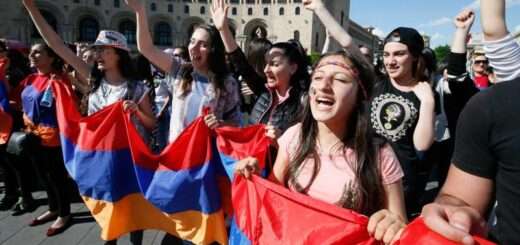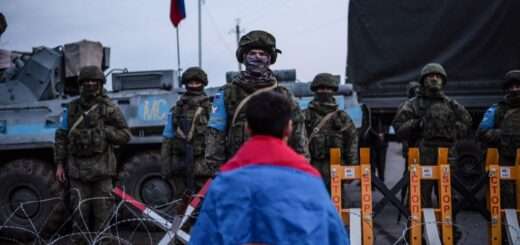Israeli Court orders release of Palestinian scholar Nadera Shalhoub-Kevorkian

An Israeli court ordered the release of Nadera Shalhoub-Kevorkian, a renowned Palestinian feminist scholar, on Friday after she was arrested at her home in Jerusalem’s Old City the previous day.
Shalhoub-Kevorkian, a professor in the faculty of law at Hebrew University in Jerusalem, was released by the court “on condition that she attend an interrogation and sign a financial guarantee,” according to Adalah, a group that advocates for the rights of Palestinians in Israel.
Israeli authorities reportedly accused Shalhoub-Kevorkian, a Palestinian from Haifa who holds Israeli citizenship, of incitement to terrorism over comments she made during an interview on the Makdisi Street podcast.
The police claimed in court that Shalhoub-Kevorkian had engaged in “serious incitement against the state of Israel by making statements against Zionism and even claiming that Israel is committing genocide in the Gaza Strip.”
The police, which are under the authority of far-right national security minister Itamar Ben-Gvir, noted Shalhoub-Kevorkian’s “significant influence” and said that they found posters in her home “portraying IDF soldiers as an occupying army.”
During a court hearing, the state’s lawyer pointed to Shalhoub-Kevorkian’s factual descriptions of Israel’s use of lethal force against Palestinians, and the withholding of slain Palestinians’ bodies, which are returned to their families in degraded conditions, as examples of professor’s dangerousness.
The state lawyer also raised suspicion that Shalhoub-Kevorkian has ties to Defense for Children International-Palestine, a respected Palestinian human rights group that is among several such groups engaged in international advocacy declared as “terrorist” organizations by Israel.
During the arrest, according to Adalah, police confiscated the feminist scholar’s “mobile phone, computer, documents and books by the Palestinian poet Mahmoud Darwish.”
After a magistrate court ordered Shalhoub-Kevorkian’s release, “finding no merit to their claim that she is dangerous and should remain in detention,” according to Adalah, the decision was upheld by a district court that rejected a police appeal.
Criticism of Zionism criminalized
Adalah said on Friday that “the police’s arguments clearly show that the arrest of Professor Shalhoub-Kevorkian is unlawful, targeting her research, academic work and opinions critical of Israel in international forums.”
Hassan Jabareen, the professor’s lawyer, said that Shalhoub-Kevorkian had been questioned about her published academic work.
Jabareen “said that this was the first time that an academic in Israel had been questioned about a published academic article, and that these were old articles that have been taught for years,” the Tel Aviv daily Haaretz reported.
The transcript of the magistrate court hearing on Friday shows that Jabareen also said that this was “the first time in 25 years that Israeli police stand before a court and presents, as one of the grounds for detention, that the defendant harshly criticizes Zionism.”
He added that “it is also for the first time we hear since the [International Court of Justice’s] decision on the matter of genocide that Israeli police argue before the court that criticism on the matter of genocide is grounds for arrest.”
Fear and violence
“Don’t misunderstand me … I was talking to all my friends saying ‘not in my name,’” Shalhoub-Kevorkian says about her reaction to the stories that came out of the 7 October attacks.
“I will never allow anybody to touch a baby, to kidnap a child, to rape a woman, this is not in my name and I will never accept it as a Palestinian, because all our lives we fought for the dignity, for life, for the wholeness of a human, and not the opposite,” she says.
Later in the interview, she discusses how despite the destruction wrought in Gaza, Israel is not powerful and describes Israelis recoiling in fear when they hear her speaking Arabic on the street.
“They should be afraid,” Shalhoub-Kevorkian says, “because criminals are always afraid. They cannot dispossess my land, they cannot displace my people, they cannot kill and not be afraid, so they better be afraid.”
“This is why they are afraid, because they cannot look us in [the] face,” she adds.
These comments, which were presented by Israel’s police as incitement to terror, establish that Israelis’ fear stems from the mistreatment of Palestinians, implying that Israelis will never achieve security through violating the rights of another people.
“The power they have is the power that the global community is giving them,” Shalhoub-Kevorkian explains. She adds that “a global political movement” is needed to stop the “vicious criminals” in Israel’s leadership.
“Just abolish Zionism,” she says of Israel’s state ideology that drives the genocidal violence shattering Palestinian bodies in Gaza.
“It can’t continue … It’s criminal. Only by abolishing Zionism can we continue, this is what I see,” she adds – comments also cited by Israel’s police.
Asked about a UN report on sexual violence on 7 October, Shalhoub-Kevorkian says during the Makdisi Street interview that she reads it as “shaming the state of Israel,” because it’s exploiting women for political aims.
Makdisi Street interview, Shalhoub-Kevorkian and her hosts discuss the pervasive gender-based violence used against Palestinians during Israel’s ground invasion of Gaza – including the public spectacle of detained men stripped of their clothing and soldiers filming themselves playing with Palestinian women’s lingerie.
The feminist scholar’s arrest over the interview represents a serious escalation. Shalhoub-Kevorkian has been been subjected to harassment for months after signing a call for an immediate ceasefire in Gaza published by childhood researchers and students in late October.
Hebrew University suspended the professor shortly after the Makdisi Street interview before reinstating her after coming under international criticism.
The university condemned both Shalhoub-Kevorkian’s comments as well as her arrest, saying “there is no place to arrest a person for such remarks, however infuriating they may be.”
Ussama Makdisi, one of three brothers who host the Palestine-focused Makdisi Street podcast, said that “the arrest and persecution of the brilliant Nadera Shalhoub-Kevorkian is a testament to her strength and the fear colonial Zionists have of one who engages intellectually and ethically in exposing the nature of their project.”
Hebrew University’s role
Through their podcast’s account on X, the Makdisi brothers, who are all academics, said that they view Shalhoub-Kevorkian’s arrest as “an attempt to silence critique of Israeli state violence in a context of a society infused with open genocidal incitement and discourse.”
They added that they “hold the Hebrew University of Jerusalem responsible for the arrest and detention of Professor Shalhoub-Kevorkian because of its persistent and public repression of her academic freedom, which led directly to today’s arrest.”
Israeli academic Neve Gordon, writing on behalf of the British Society for Middle Eastern Studies’ committee on academic freedom, told the president and rector of Hebrew University that a letter they had sent to Shalhoub-Kevorkian in late October has the “capacity to incite both verbal and physical violence against” the professor.
Gordon said that the widespread dissemination of the Hebrew University leaders’ letter “has potentially endangered Professor Shalhoub-Kevorkian’s mental and physical wellbeing and contravenes your duty of care towards her.”
The letter from the Hebrew University heads protests Shalhoub-Kevorkian’s endorsement of the ceasefire call and urges her to resign from her academic position.
The Palestinian academic Nimer Sultany also blamed Hebrew University for Shalhoub-Kevorkian’s arrest.
“They incited the mob against their own employee, twice, since October, briefly suspending her from work, because of her anti-war speech and because of their fanatical support for genocide,” Sultany said.
He encouraged engagement with Shalhoub-Kevorkian’s extensive academic work as a means of showing solidarity with the feminist scholar.







